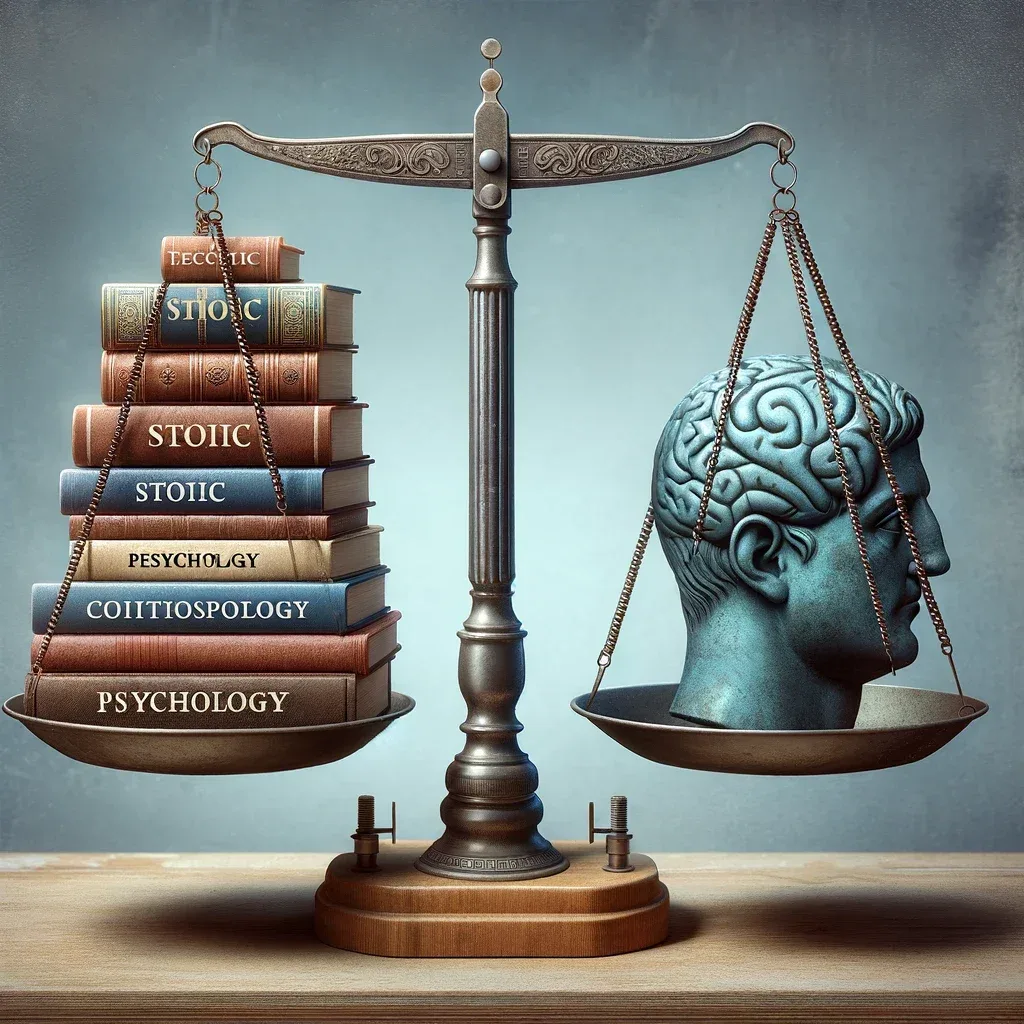Stoicism, an ancient Greek philosophy, has played a key role in the development of Cognitive Behavioral Therapy (CBT), a modern psychotherapeutic approach. This article explores the influence of Stoicism on CBT, highlighting how Stoic principles intertwine with CBT techniques and theories. We will delve deeper into the connections between the two practices, examining how Stoicism has shaped CBT and how this therapeutic approach continues to evolve, incorporating ancient philosophical principles into a contemporary clinical context.

Stoic Roots in CBT

Philosophical Foundations of Stoicism
Stoicism, founded by Zeno of Cício in the early XNUMXrd century BC, is centered on the idea of living in harmony with nature and controlling emotions through reason. The Stoics believed that although we cannot control external events, we can control our reactions to them. This notion of self-control and acceptance is a central pillar in both Stoicism and CBT.
Stoicism and the Concept of CBT
CBT, developed in the 1960s by Aaron Beck, is based on the idea that our thoughts influence our feelings and behaviors. The connection between Stoicism and CBT lies in the emphasis on the power of thoughts and the ability to use reason to shape our emotional and behavioral responses.
Stoic Teachings in the Practice of CBT
Several Stoic concepts, such as the idea that disturbances arise not from events but from our interpretations of them, are incorporated into CBT. The cognitive restructuring technique, a central component of CBT, echoes the Stoic approach of examining and modifying irrational or destructive thoughts.
Practical Application in TCC

CBT Techniques Inspired by Stoicism
Many CBT techniques have Stoic roots, including identifying and challenging irrational beliefs, focusing on the present, and accepting uncontrollable situations. These techniques help patients develop greater emotional resilience, a goal shared with stoicism.
Use Cases in TCC
CBT, informed by Stoic principles, has been shown to be effective in treating a variety of disorders, including depression, anxiety and mood disorders. By teaching patients to modify their thinking patterns, CBT enables better management of emotions and behaviors.
Results and Effectiveness
Studies have demonstrated the effectiveness of CBT in treating various psychological conditions. This therapeutic approach, enriched by Stoic wisdom, offers practical tools for individuals to face mental and emotional challenges in a more efficient and healthy way.
Modern Implications of Stoicism in CBT

Stoicism in Contemporary Mental Health
The resurgence of interest in Stoicism in the modern era highlights its ongoing value for mental health. CBT, as a practical application of Stoicism, demonstrates how ancient teachings can be adapted to benefit contemporary society.
Future Developments at TCC
The integration of Stoicism into CBT continues to evolve, with research and clinical practice seeking ways to improve therapeutic effectiveness. The increasing focus on resilience, mindfulness, and acceptance illustrates how stoicism continues to influence the field of mental health.
Expanding the Reach of TCC
The growing popularity of CBT, combined with the rediscovery of Stoicism, suggests a promising future for the application.
action of these principles across the wide range of challenges in modern life, from workplace stress to managing interpersonal relationships.
Conclusion
The connection between Stoicism and Cognitive Behavioral Therapy highlights the importance of ancient philosophy in addressing contemporary mental health issues. By understanding how Stoicism intertwines with CBT practices, we gain valuable insights into how our thoughts and beliefs shape our experiences and behaviors. This fusion of ancient wisdom and modern therapy continues to offer new perspectives and tools for facing life's challenges, demonstrating that Stoic teachings remain as relevant today as they were in Ancient Greece.

Frequently Asked Questions about Stoicism in Cognitive Behavioral Therapy
In this FAQ, we explore key questions related to Stoicism's influence on Cognitive Behavioral Therapy (CBT), providing in-depth insights into how this ancient philosophy continues to shape modern therapeutic practices.






